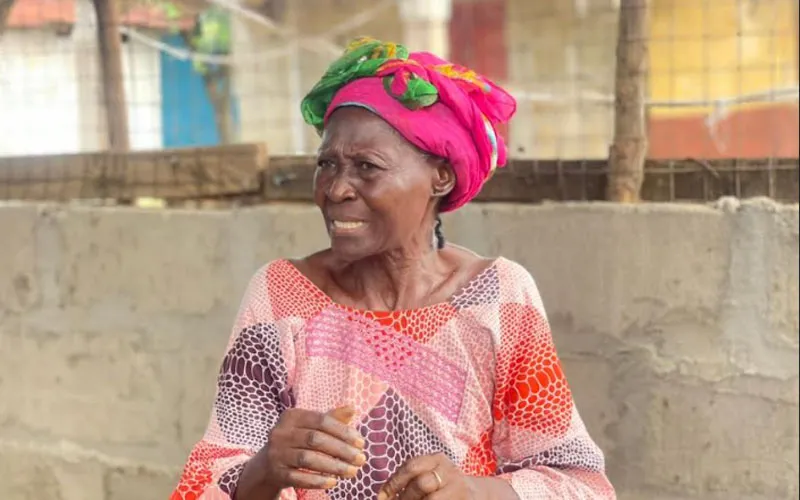She said that authorities are always slow in dealing with cases of abuse and always solicit for bribes from those seeking justice.
“Traditional leaders are also a major setback in our activities. They are always seeking to arbitrate the SGBV matters and they hardly deliver justice,” she said, and added, “One of our cases at the moment is that of a Muslim Cleric who has been sexually assaulting an eight-year-old girl. When she spoke out, everyone was against her, warning her not to speak ill of the Cleric. We have her at our safe house.”
At the meeting that was organized at Sesay’s home, Sylvia Wright, a Paralegal officer working with Caritas Freetown-JPC said that the justice department of the development arm of the Catholic Church in Freetown started journeying with women in New Camp in 2017.
“We realized that cases of SGBV in this part of Sierra Leone were too high and they stemmed from the civil war. The government was not doing anything to help and the women were left to fight for themselves,” Ms. Wright said.
Activities of Caritas Freetown-JPC department in New Camp include advocacy against SGBV, sensitization of women and girls on their rights and training of community workers on how to handle cases of abuse.
(Story continues below)
Women in the community are also supported to start farming, which is the main economic activity in New Camp.
“Caritas has trained us on growing peanuts, which we eat and sell the surplus to make some money. They have also brought experts who trained us on many farming issues, including producing organic fertilizers to grow organic food,” Sesay said, adding that women at the camp have also been taking through nutrition lessons and how they can eat affordable balanced diets to give birth to healthy babies.
In Grafton alone, Caritas Freetown-JPC works with 12 other camps with targeted SGBV prevention and mitigation activities, Ms. Wright said.
She added, “Here, we support women in farming because that is their main economic activity. There are places where we support women to start small businesses and to grow them. Here in New Camp, we bring women seeds and tools and take them through training. We come here every two weeks to check on them. We have also helped them to open bank accounts and to save as much as possible to grow their farming ventures.”
The women have also been trained on how to handle SGBV cases, the Paralegal officer said, and added, “Now, women like Sesay and many others know which cases of abuse they can handle and which to refer to authorities. We have seen them follow up on many cases that saw victims get justice.”
In a past interview with ACI Africa, Eliza Sillah, the Programs Manager of Caritas Freetown-JPC said that violence in many communities experiencing high cases of SGBV starts from families, “sometimes because of the dependency of women on their husbands.”
“We therefore empower these women economically and increase their decision-making power in the families,” Eliza said during the November 3 interview, and added, “Some women have said that after our intervention, their husbands now borrow money from them and have developed more respect for them.”
Activities of Caritas Freetown-JPC include legal education, advocacy, empowerment of marginalized girls and vulnerable women, response to SGBV, violence prevention, and capacity building, among others.
Caritas Freetown-JPC’s clinics are fully equipped with social workers, paralegals and other qualified staff to handle the community challenges. Cases that are difficult to handle are referred to authorities.
The women are equipped with skills to practice farming and to engage in businesses. Those willing to engage in businesses are given loans, Eliza said.
She added, “Before, we gave them money to invest in businesses but they would use it on other needs that they thought were more pressing. Then we changed strategy and we now accompany each woman from the identifying business they want to engage in, taking them for training and even going with them to the market to buy the things they wish to sell. This way, they don’t divert the money meant for business to other uses.”
“We have been accompanying these women in their businesses and from our latest analysis, we were happy to note that 98 percent of women we supported with small businesses are still doing it, and most of them have massively expanded their businesses,” Eliza said, adding that the women have also been encouraged to start saving every month.
She said that apart from economic empowerment, women also develop social cohesion as they interact in their saving and investments groups.
Caritas Freetown-JPC has also played an advocacy role that has seen a law that prohibited women from purchasing apartments “unless they were accompanied by a male partner” reviewed. This, Eliza said, has seen many women get empowered to buy and own apartments by themselves.
Agnes Aineah is a Kenyan journalist with a background in digital and newspaper reporting. She holds a Master of Arts in Digital Journalism from the Aga Khan University, Graduate School of Media and Communications and a Bachelor's Degree in Linguistics, Media and Communications from Kenya's Moi University. Agnes currently serves as a journalist for ACI Africa.








